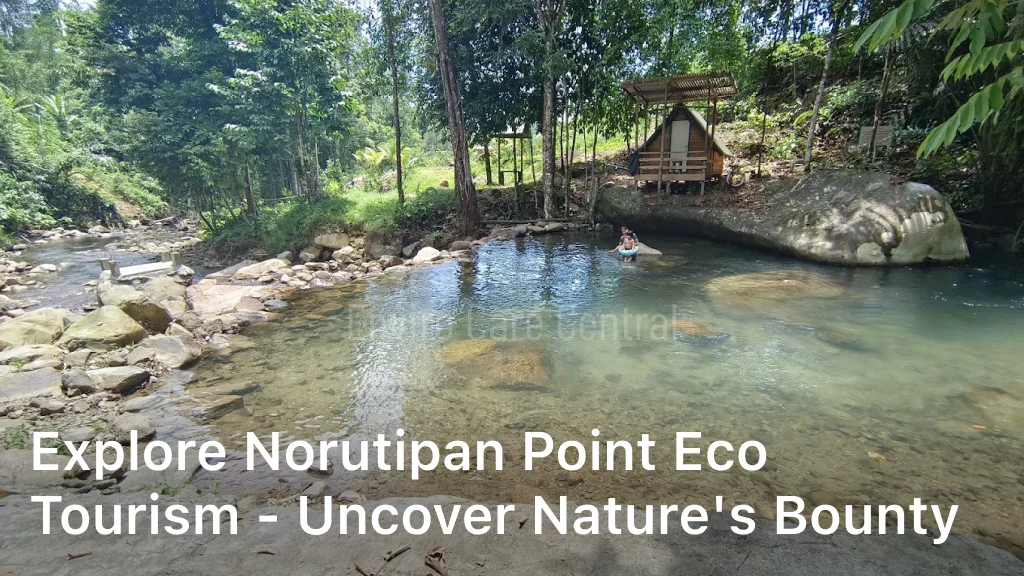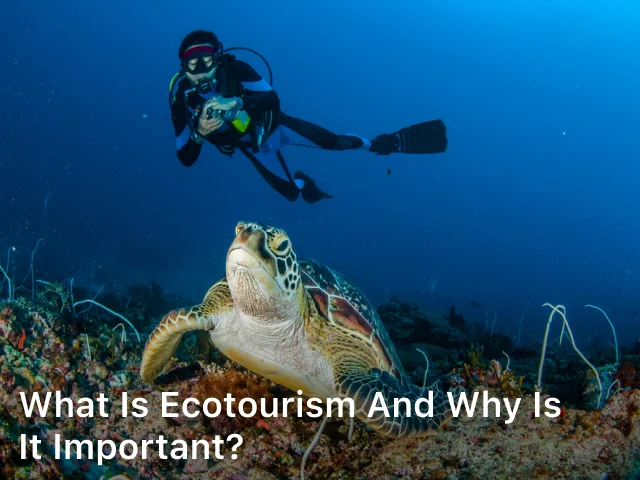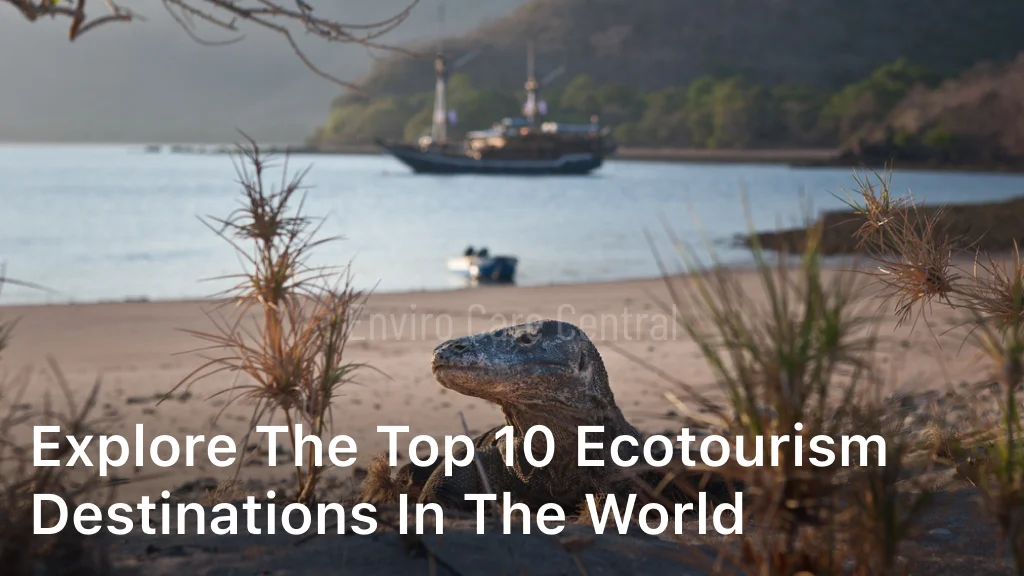The Benefits of Ecotourism for Environment and Local
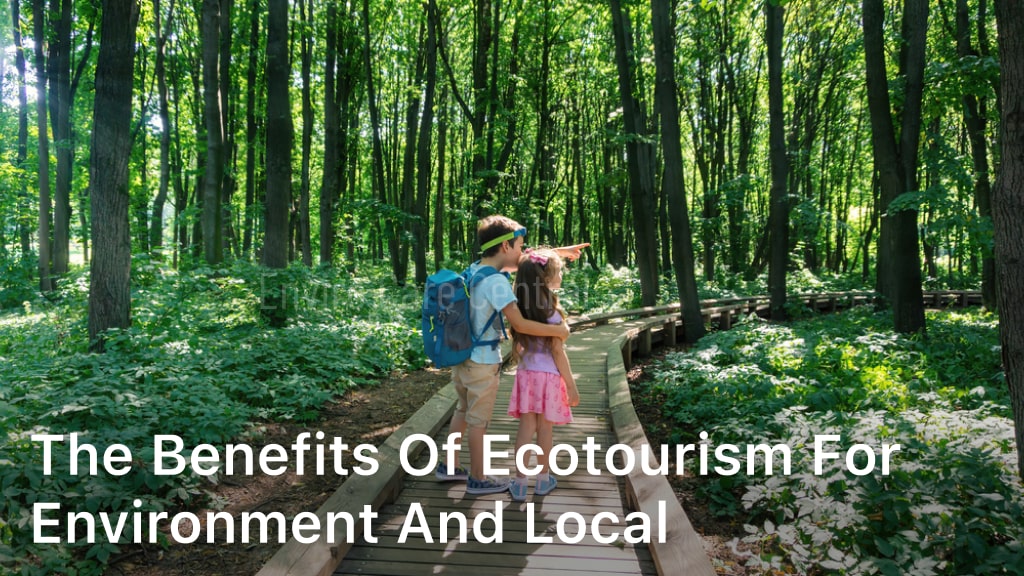
envirocarecentral.com. The Benefits of Ecotourism for Environment and Local – Explore the benefits of ecotourism for environment as we unveil how it fosters sustainability and local growth. Join our journey towards eco-conscious travel.
As travelers, we have the power to make a positive impact on the places we visit. Ecotourism, or sustainable tourism, offers a way for us to explore new destinations while also supporting the environment and local communities.
Ecotourism is a win-win for everyone involved. The surrounding environment benefits from sustainable tourism practices, and local communities thrive from the economic and social growth that comes with it.
Let’s take a closer look at some of the benefits of ecotourism for both the environment and local communities.
Key Takeaways:
- Ecotourism supports the environment and local communities.
- Ecotourism promotes sustainability and positive growth.
- Travelers can make a positive impact through sustainable tourism practices.
- Local communities benefit economically and socially from ecotourism.
- Ecotourism is a responsible and rewarding way to travel.
What is Ecotourism?
Ecotourism is a form of sustainable tourism that focuses on responsible travel to natural areas, with the aim of conserving the environment, respecting local cultures, and promoting the well-being of both the visitors and the local communities.
The primary goal of ecotourism is to minimize the impact on the natural and cultural environments while providing educational and enriching experiences for tourists.
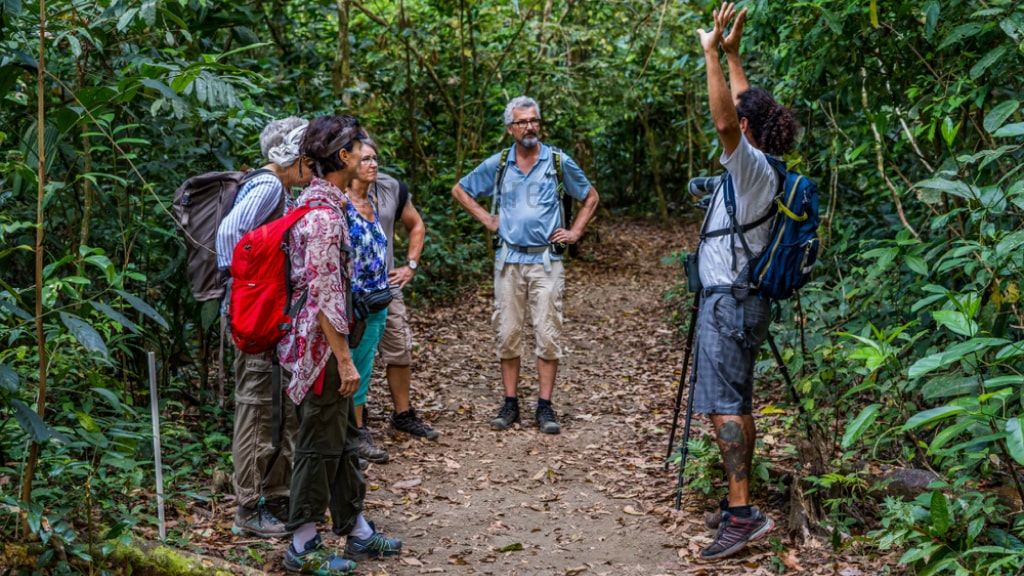
Benefits of Ecotourism for Environment
Ecotourism, when properly planned and managed, can offer several benefits for the environment. Here are some key advantages:
- Conservation of Biodiversity: Ecotourism often takes place in natural areas with rich biodiversity. By promoting responsible tourism practices, ecotourism can contribute to the conservation of flora and fauna. Well-managed ecotourism initiatives can help protect endangered species and their habitats.
- Habitat Preservation: Ecotourism projects typically prioritize the preservation of natural habitats. This involves minimizing the impact of tourism infrastructure, such as accommodations and trails, to maintain the integrity of ecosystems. This can result in the long-term protection of valuable habitats.
- Community Involvement and Empowerment: Ecotourism often involves local communities in its planning and operation. By providing economic incentives and involving local residents in conservation efforts, ecotourism can empower communities to actively participate in protecting their natural surroundings. This can create a sense of ownership and pride in local ecosystems.
- Educational Opportunities: Ecotourism provides a platform for environmental education. Visitors have the opportunity to learn about the significance of biodiversity, ecosystem dynamics, and the importance of conservation. This increased awareness can lead to more environmentally conscious behavior among tourists and locals alike.
- Sustainable Development: Responsible ecotourism practices emphasize sustainable development, considering the long-term impact on both the environment and the local communities. This approach seeks to balance economic benefits with environmental protection, ensuring that the benefits of tourism contribute to the well-being of both the environment and the people.
- Alternative Income Sources: By promoting ecotourism, communities can diversify their sources of income. This can reduce dependency on activities that might harm the environment, such as logging or unsustainable agriculture. A diversified income base can make communities more resilient to economic fluctuations.
- Preservation of Cultural Heritage: Ecotourism often incorporates cultural experiences, highlighting the importance of traditional practices and indigenous knowledge. This can contribute to the preservation of cultural heritage, fostering a sense of pride and identity among local communities.
- Reduced Carbon Footprint: Some ecotourism initiatives actively work to minimize their carbon footprint. This includes adopting sustainable practices in transportation, accommodations, and other aspects of tourism. By doing so, ecotourism can contribute to the global effort to combat climate change.
Preserving Natural Landscapes and Biodiversity
Ecotourism plays a crucial role in preserving natural landscapes and conserving biodiversity. By practicing eco-conscious travel, we can help protect fragile ecosystems and endangered species, ensuring their long-term survival.
One way in which ecotourism promotes the preservation of natural landscapes is by providing alternative sources of income for local communities. Instead of exploiting natural resources for profit, communities can rely on sustainable tourism practices to generate income while preserving their natural resources. This creates a win-win situation where both the environment and the community benefit.
“Ecotourism provides a way for individuals to experience natural landscapes without causing harm to the environment. It helps raise awareness about the importance of conservation and encourages responsible travel practices.”
Another major benefit of ecotourism is its role in the conservation of biodiversity. By choosing to visit eco-friendly destinations and participating in activities that promote conservation, travelers can help protect the delicate balance of nature.
For example, some eco-tour companies offer guided tours that teach travelers about the different plant and animal species in the area and highlight the importance of protecting them.
This kind of educational experience helps to build a sense of responsibility and encourages travelers to become advocates for conservation.
| Benefits of Ecotourism for the Preservation of Natural Landscapes and Biodiversity: | Examples: |
|---|---|
| Reduces exploitation of natural resources for profit | Local communities rely on sustainable tourism practices rather than exploiting natural resources for profit. |
| Encourages conservation of ecosystems and wildlife | Guided tours that teach travelers about the importance of protecting local plant and animal species. |
| Raises awareness about the importance of conservation | Ecotourism promotes responsible travel practices and educates travelers about the impact of their actions. |
Promoting Environmental Education and Awareness
At the heart of ecotourism is the desire to educate and raise awareness about the importance of preserving our planet. Through experiential learning and immersion in natural environments, travelers gain a deeper understanding of the delicate balance between humanity and nature.
The Role of Ecotourism in Environmental Education
Ecotourism encourages environmental education by providing travelers with opportunities to learn about the ecosystems they visit. For example, guided tours through rainforests or coral reefs can educate visitors on the unique flora and fauna found in these areas and the role they play in sustaining their environment.
“Ecotourism fosters a sense of responsibility and encourages travelers to take action to protect our planet.”
Hands-on experiences, such as bird-watching or tree-planting, can teach travelers about the impact of human activities on natural habitats. By connecting with nature and understanding the consequences of our actions, ecotourism fosters a sense of responsibility and encourages travelers to take action to protect our planet.
Raising Environmental Awareness through Ecotourism
Ecotourism can also raise environmental awareness by sparking conversations and inspiring travelers to make conscious choices. For example, educational seminars on sustainable practices at eco-lodges or nature reserves can teach visitors about reducing their carbon footprint and the benefits of environmentally friendly products and practices.
Furthermore, ecotourism can inspire individuals to become advocates for environmental causes. By witnessing the beauty and fragility of our natural world firsthand, travelers can gain a new appreciation for the importance of conservation efforts and become motivated to support these initiatives.
The Importance of Environmental Education and Awareness
Promoting environmental education and raising awareness is crucial for the long-term sustainability of our planet. By educating individuals and raising awareness about the impact of human actions on the environment, we can work towards reducing our carbon footprint and protecting the natural habitats and resources that sustain us.
Through ecotourism, we can inspire and empower individuals to make conscious choices and take action to preserve our planet for future generations.
Supporting Local Economies and Communities
One of the most significant benefits of ecotourism is the positive impact it has on local economies and communities. By promoting sustainable practices, eco-tourists generate income and create employment opportunities for the people living in the surrounding areas.
Moreover, ecotourism helps to preserve the cultural heritage of local communities by encouraging visitors to experience their unique way of life. This, in turn, helps to promote community development through the creation and growth of small businesses that support local artisans, farmers, and other entrepreneurs.
Research has shown that ecotourism can have tangible economic benefits for local communities. For example, a study conducted by the World Tourism Organization found that ecotourism generates up to three times more revenue than traditional tourism.
Additionally, the same study found that eco-tourists tend to stay longer and spend more money in the local economy than traditional tourists, providing a sustainable source of income for the community.
Case Study: Community-based Ecotourism in Costa Rica
Costa Rica is widely recognized for its successful implementation of community-based ecotourism. For example, the town of Monteverde has developed a thriving ecotourism industry by working with local communities to provide unique and sustainable travel experiences.
| Benefits of Community-Based Ecotourism in Monteverde | Statistics |
|---|---|
| Provides a sustainable source of income for local communities | 80% of the Monteverde community is involved in ecotourism |
| Preserves the natural environment and local culture | Monteverde is home to over 2,500 species of plants and animals, many of which are endemic to the region |
| Creates job opportunities and promotes community development | Ecotourism accounts for approximately 80% of all employment in Monteverde |
As shown in the table above, community-based ecotourism has had a significant impact on the local economy and community of Monteverde.
By promoting sustainable practices, preserving the natural environment and local culture, and creating job opportunities, ecotourism has become a cornerstone of the community’s economic and social development.
In conclusion, ecotourism is not just about protecting the environment but also about supporting and improving the lives of the people who live in the surrounding areas. By supporting local economies and communities, ecotourism offers a sustainable way to travel that benefits both travelers and locals alike.
Keep Reading : Safari Outdoor Adventure Park, The Best Park for Ecotourism
Conclusion
In conclusion, we believe that ecotourism offers numerous benefits for the environment and local communities. Through ecotourism, we can take steps to preserve natural landscapes, conserve biodiversity, and promote environmental education and awareness, all while supporting the economic growth of local communities.
By choosing eco-conscious travel options, we can contribute to a sustainable future for our planet and its inhabitants. It is important for us to embrace responsible and sustainable tourism practices that promote positive growth and long-term environmental protection.
Let’s make a conscious effort to reduce our impact on the planet and support the livelihoods of local communities through ecotourism. Together, we can make a difference and ensure a brighter future for generations to come.
FAQ
What are the benefits of ecotourism for the environment?
Ecotourism has numerous benefits for the environment. By promoting sustainable travel practices, it helps to minimize negative impacts on natural landscapes, conserve biodiversity, and protect fragile ecosystems. Ecotourism also supports conservation efforts and encourages the preservation of pristine environments for future generations.
How does ecotourism benefit local communities?
Ecotourism plays a significant role in supporting local economies and communities. It creates job opportunities, especially in rural areas, and generates income for local businesses such as accommodations, restaurants, and tour operators. Additionally, ecotourism often emphasizes cultural preservation, allowing communities to showcase their traditions, arts, and heritage.
Does ecotourism promote environmental education and awareness?
Yes, ecotourism initiatives actively promote environmental education and raise awareness among travelers. Through guided tours, workshops, and interactive experiences, visitors can learn about the importance of biodiversity, conservation, and sustainable practices. These educational opportunities inspire individuals to become more environmentally conscious and make positive changes in their own lives.
How does ecotourism contribute to the local economy?
Ecotourism contributes to the local economy in several ways. Firstly, it creates employment opportunities directly in the tourism industry, such as tour guides, park rangers, and hospitality staff. Secondly, it stimulates economic growth by attracting visitors who spend money on accommodations, meals, souvenirs, and other local products and services. Lastly, ecotourism can help diversify the economy of a region, reducing dependence on a single industry.
What is the conclusion about the benefits of ecotourism?
In conclusion, ecotourism provides a range of benefits for both the environment and local communities. It helps preserve natural landscapes, conserves biodiversity, promotes environmental education and awareness, and supports the local economy. By embracing eco-conscious travel, we can contribute to a sustainable future for our planet and its inhabitants.

